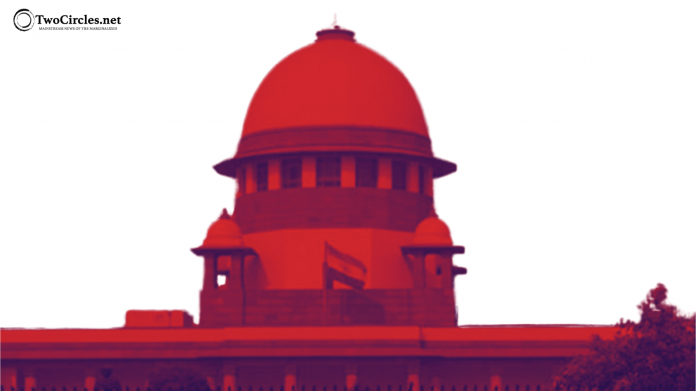A two-judge division bench of Justice M.R. Shah and C.T Ravikumar refused to stay the Madhya Pradesh high court order that restricted the state government from prosecuting interfaith couples.
Huneza Khan| TwoCircles.net
BHOPAL (MADHYA PRADESH) — The Supreme Court on Tuesday refused to stay the Madhya Pradesh high court’s order that restricted the state government from taking coercive actions against interfaith couples who get informing the district magistrate.
The apex court told the Madhya Pradesh government that not all religious conversions are “illegal.”
A two-judge division bench of Justice M.R. Shah and C.T Ravikumar marked that, “all conversions cannot be said to be illegal conversions”. The matter will be heard again on February 7.
Representing the State, Solicitor General Tushar Mehta argued that, “there is no prohibition against marriage or conversion, you intimate the district magistrate so that he has an occasion to ensure there is no allurement”.
Earlier, the state government had filed a petition against the high court order on which the Supreme Court issued a notice.
Reacting to the Supreme Court observation, State Home Dr Minister said that “the state government is determined to ensure that illegal conversion does not take place.”
“We will strongly present our case to the Supreme Court,” he said.
धर्मांतरण का विषय सुप्रीम कोर्ट में विचाराधीन है। प्रदेश में अवैध धर्मांतरण न हो इसके लिए राज्य सरकार कटिबद्ध है। हम अपने पक्ष को मजबूती के साथ सुप्रीम कोर्ट में रखेंगे। pic.twitter.com/7L5DbW8VG0
— Dr Narottam Mishra (@drnarottammisra) January 4, 2023
What MP High Court had said?
In an interim order dated November 2022, the two-judge division bench of Justice Sujoy Paul and Justice Prakash Chandra at Madhya Pradesh high court had found Section 10 of the Madhya Pradesh Freedom of Religion Act (MPFRA) “ex-facie unconstitutional.” The court further directed the respondent (state government in this case) neither to prosecute adult citizens if they solemnize the marriage of their own will nor to take coercive actions against them for violation of Section 10 of MPFRA.
“Considering the aforesaid judgments, in our considered opinion, a strong prima facie case is made out by the petitioners for the grant of interim protection in relation to the marriage of two adult citizens on their volition and against any coercive action for violation of Section 10 of the Act of 21. Section 10 makes it obligatory for a citizen desiring conversion to give a declaration in this regard to the District Magistrate which in our opinion ex facie, is unconstitutional in the teeth of aforesaid judgments of this Court. Thus, till further orders, the respondent shall not prosecute the adult citizens if they solemnize the marriage of their own volition and shall not take coercive action for violation of Section 10 of Act of 21,” the interim order reads.
What does section 10 of MPFRA say?
According to Section 10 of the Madhya Pradesh Freedom of Religion Act (MPFRA), interfaith couples who decided on religious conversion for marriage had to give notice to authorities informing them that they are wilfully converting their religion and they are not forced to do it. This law was challenged by the petitioners and declared unconstitutional by Madhya Pradesh High Court until further orders. This section was the violation of the right to privacy and the right to freedom of religion. After the interim order of the Court, if any individual or a party is found violating section 10 of MPFRA the state cannot take coercive action against them.
The Madhya Pradesh Freedom of Religion Act 2021 was an ordinance passed with voice votes amidst the chants of Jai Sri Ram (Glory be to Lord Ram) in the state assembly. It prohibits religious conversion by fraud, allurement, coercion, etc. The violation of the law would result in imprisonment and a fine. The Hindi cow belt became the third state for passing such a law after Himachal Pradesh and Uttar Pradesh.
Huneza Khan is a journalist from Bhopal, Madhya Pradesh. She tweets @KhanHuneza
[Edited by Irfan Mehraj. Tweets at @IrfanMeraj]


